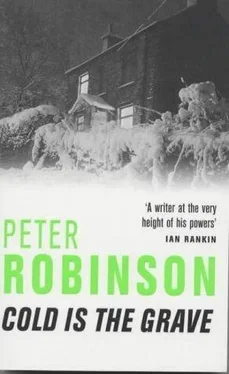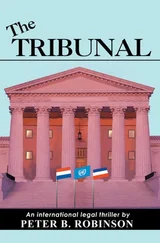“Yeah, well, that’s what she said. Wouldn’t let her do anything, go anywhere. Kept her a virtual prisoner in the house.”
“Lock up your daughters?”
“Yeah. Did you?”
“You know what she’s like. What do you think I should have done?”
“With Louisa? I used to think I knew what she was like. Now I’m not so sure. From what you say, she told me a pack of lies right from the start. How can I believe anything about her? What do you do with someone like her?”
Indeed, thought Banks, feeling just a little guilty over his deception. What do you do? The thing was, that the more he found himself pretending to be Louisa’s father, the more he found himself slipping into the role. So much so that on the slow train back to Euston later that evening, after Craig had kindly given him a lift to the station, when he thought about what his own daughter might be up to in Paris with Damon, he wasn’t sure whether he was angry at Tracy or at Emily Riddle.
And the more he thought about the situation, the more he realized that it had never been finding Emily Riddle that concerned him; it was what he was going to do after he’d found her that really bothered him.
Saturday morning dawned cool and overcast, but the wind was quickly tearing a few holes in the ragged clouds. “Enough blue sky to make baby a new bonnet,” as Banks’s mother would say. Banks lingered over coffee and a toasted tea cake in a café on Tottenham Court Road, not far from his hotel, reading the morning papers and watching people checking out the electronics shops across the road.
He had slept well. Surprisingly so, since the hotel was the same one that he and Detective Sergeant Annie Cabbot had stayed in during his last case. Not the same room, thank God, but the same floor. Memories of her skin warm and moist against his kept him awake longer than he would have liked and made him feel vaguely guilty, but in the end he drifted into a deep and dreamless sleep, from which he awoke feeling unusually refreshed.
According to his A to Z , Ruth Walker lived quite close to the cramped flat off Clapham Road that Banks and Sandra had lived in for a few years in the early eighties, when the kids were little. Not exactly the “good old days,” but happy for the most part, before the Job started taking too much of a toll on him. Simpler, maybe. Sandra worked part-time as a dental receptionist on Kennington Park Road, he remembered, and Banks was usually too busy out playing cops and robbers to take his wife to the theater or help the kids with their homework.
It wasn’t much more than a couple of miles from the West End, as the crow flies, and he decided the walk would do him good. He had always loved walking in cities, and London was a great place for it. He had been cheated out of Paris, so he would have to make the best of where he was. If he set off now, he realized, he would probably arrive around lunchtime. If he got Louisa’s address from Ruth, he would go there in the early evening, between six or seven, which he had always found was a good time to catch people in. That should also leave him plenty of time to meet Sandra at eight in Camden Town.
A cool wind skipped off the murky river and whistled around his ears as he crossed Lambeth Bridge. He glanced back. Shafts of light lanced through the clouds and lit on the Houses of Parliament. It was odd, Banks thought, but when you visit a place you used to live in for a long time, you see it differently; you become more like a tourist in your own land. He would probably never have even noticed Big Ben or the Houses of Parliament in the days when he had lived there. Even now, his copper’s eye was more tuned to the two shifty-looking skinheads across the road, who seemed to be following a couple of Japanese tourists, than it was to the beauty of the London architecture.
It was pushing twelve-thirty when Banks got to Ruth’s street just off Kennington Road. The brick terrace houses were four stories high and so narrow they seemed pressed together like a mouthful of bad teeth. Here and there someone had added a lick of bright paint to a window frame, or put out a few potted plants in the bay window.
The name “R. A. Walker” appeared by the third-floor bell, a dead giveaway that the occupant was a woman. Banks pressed and heard it ring way up in the distance. He waited, but nobody came. Then he tried again. Still nothing. After standing on the doorstep for a few minutes, he gave up. He hadn’t wanted to phone ahead and tip her off that he was coming – finding that surprise often worked best in situations like this – so he had been prepared to wait.
Banks decided to have his lunch and call back in an hour or so. If she wasn’t in then, he’d think of a new plan. He found a serviceable pub on the Main Street and enjoyed a pint as he finished reading the newspaper. A few regulars stood at the bar, and a younger crowd was gathered around the video machines. One man, wearing a tartan cap, kept nipping around the corner to the betting shop and coming back to tell everyone in a loud voice how much he’d lost and how the horse he’d backed belonged in the glue factory. Everyone laughed indulgently. Nobody paid Banks any mind, which was just the way he liked it. He glanced over the menu and settled finally on a chicken pot pie. It would have suited Annie Cabbot just fine, Banks thought as he searched in vain among peas and carrots for the meat; Annie was a vegetarian.
A short while later, he stood on Ruth Walker’s doorstep again and gave her bell a long push. This time, he was rewarded by a wary voice over the intercom.
“Who is it?”
“I’ve come about Louisa,” Banks said. “Louisa Gamine.”
“Louisa? What about her? She’s not here.”
“I need to talk to you.”
There was a long pause – so long that Banks thought Ruth had hung up the intercom on him – then the voice said, “Come up. Top floor.” A buzzer went off and Banks pushed the front door open.
The stairs were carpeted, though the fabric had worn thin in places and the pattern was hard to make out. A variety of cooking smells assailed Banks as he climbed the narrow staircase: a hint of curry, garlic, tomato sauce. When he got to the top, there was only one door. It opened almost immediately when he knocked, and a young woman looked at him through narrowed eyes. After she had studied him for a while, she opened the door and let him in.
The best Banks could say of Ruth Walker was that she was plain. It was a cruel and unfair description, he knew, but it was true. Ruth was the kind of girl who, in his adolescence, always went around with an attractive friend, the one you really wanted. The Ruths of this world you usually tried to palm off on your friend. There was nothing distinguishing about her except, perhaps, the intelligence perceptible in her disconcerting and restless gray eyes. Already she seemed to have a permanent frown etched in her forehead.
She was dressed simply in baggy jeans and a T-shirt commemorating an old Oasis tour. Her hair, dyed black, gelled and cut spiky, didn’t suit her round face at all. Nor did the collection of rings and studs through the crescent edges of her ears. Her complexion looked dry as parchment, and she still suffered the ravages of acne.
The flat was spacious, with a high ceiling and one of those Chinese-style globe lampshades over the bulb. Bookshelves stood propped on bricks against one wall, not much on them, apart from tattered paperbacks and a few software manuals, and a computer stood on the desk under the window. A sheepskin rug covered part of the hardwood floor, and various quilts and patterned coverlets hung over the secondhand three-piece suite. It was a comfortable room; Ruth Walker, Banks had to admit, had made a nice home for herself.
Читать дальше












